Most Recent News


Popular News


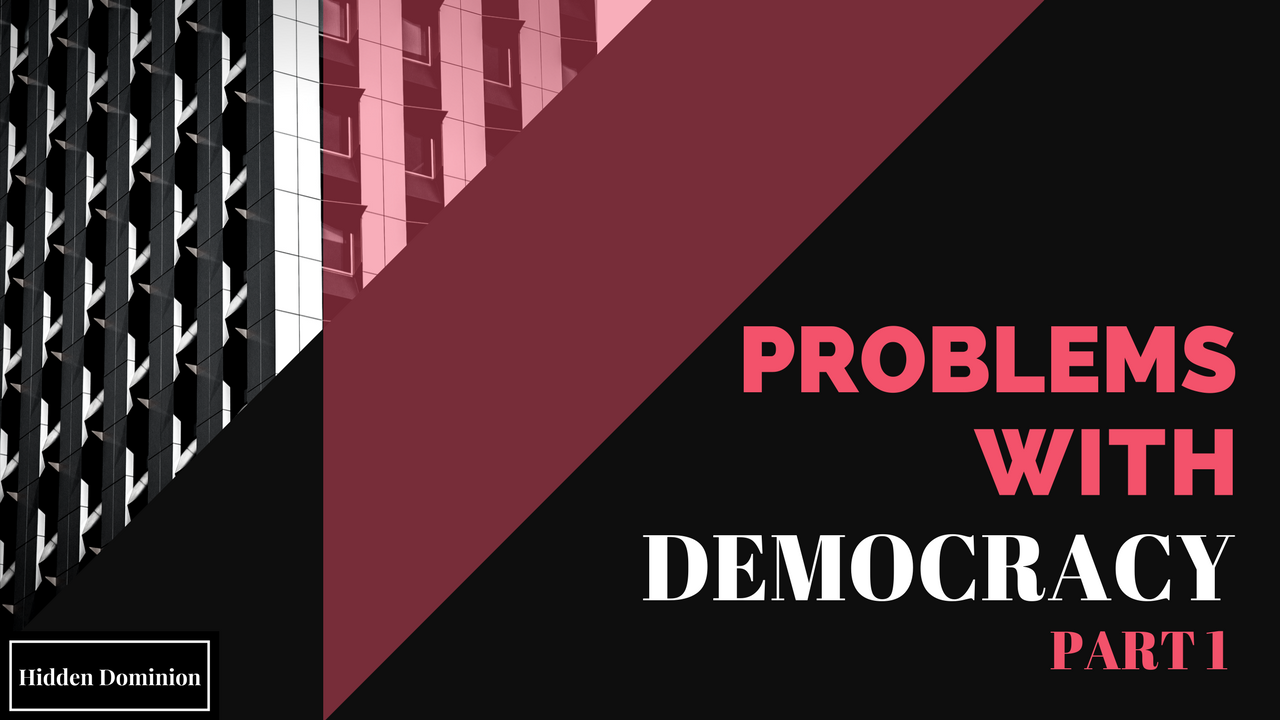
What are the Problems With Democracy? Read our article on why republics fall. Including a full list of 36 problems with democracy.
This list is a discussion on the representative (republic) form of democracy. It’s a two-part series on the problems with democracy, and why republics fall. Overall, I’ve accumulated 36 principal problems inherent in a republic form of democracy. This is not an all-inclusive list, and there are undoubtedly more issues inherent with republics, but it’s an excellent resource to get started with.
Check out the first chapter here: Problems With Democracy – Part 1.
View the second chapter here: Problems With Democracy – Part 2.
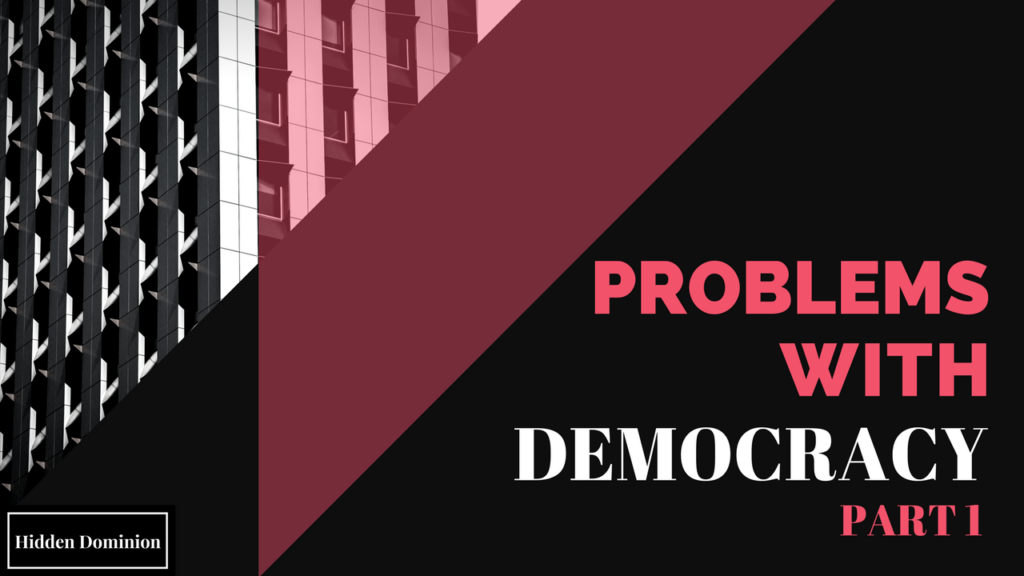
Why would anyone want to challenge democracy? I mean, after all, it is arguably the best form of government that we humans have ever had the ability to utilize.
If it worked as promised, that is.
There’s a large handful of different governmental structures. But practically all of them hinge or bounce off the ideas of three: Democracy, Rule by few, or Despotism.
When compared with the likes of communist purges under Mao’s communist regime or with ruthless dictatorships under the likes of people such as Francois Duvalier; it seems asinine to even criticize democracy. The same goes for oligarchs under a rule by few.
However, when comparing these forms of government, we miss a crucial aspect:
We miss the ability to create better alternatives.
In the past, when a person got infected by a deadly bacterial disease, the medical recommendation was to help the pain of the passing individual. However, along came Alexander Fleming in 1928, who invented Penicillin. A brighter future was achieved for humanity, because Alexander found a better alternative to the current medical regimen.
It is possible that democracy is the best form of government currently available. I don’t believe returning to the likes of communism, or fascism, would be of benefit to any true-blooded American.
But that doesn’t mean I don’t believe we could make a better form of it.
And that is part of the reason why I’ve written this list.
The other purpose for writing this is to bring awareness to people about the problems with democracy.
Many times, these issues are overlooked or purposely hidden. These are also issues that people incorrectly believe are inherent in society, rather than with the current government form.
Through reading this article, I hope you take away two key points:
As per the requirements for a democracy, you need “active participation by citizens in the democratic process.”
However, the last time over 60% of Americans voted in a presidential election was in 1968.
In certain years, like in 1996, more people did not vote than those who did.
And we have to make a special note that this is for presidential elections. They are most widely discussed and participated in.
For primaries and local/state elections, the results are incredibly more impactful for the day-to-day life of the resident. But, they are almost always lower than the presidential election turnouts.
When half of the citizens are able to vote choose not to, there is a significant problem.
The problem is exponentially increased because there is also a lack of ability to vote in certain areas. The EU has un-elected bureaucrats. Our Fed and international agencies are not voted in. Top international corporations only answer to stockholders. But yet, all of these (and more) hold tremendous sway over our lives and political rights.
And the sad part? Even if we could vote for these un-elected executives to lose their position; evidence of local/state election turnout rates indicates that hardly no American citizen would show up to do so.
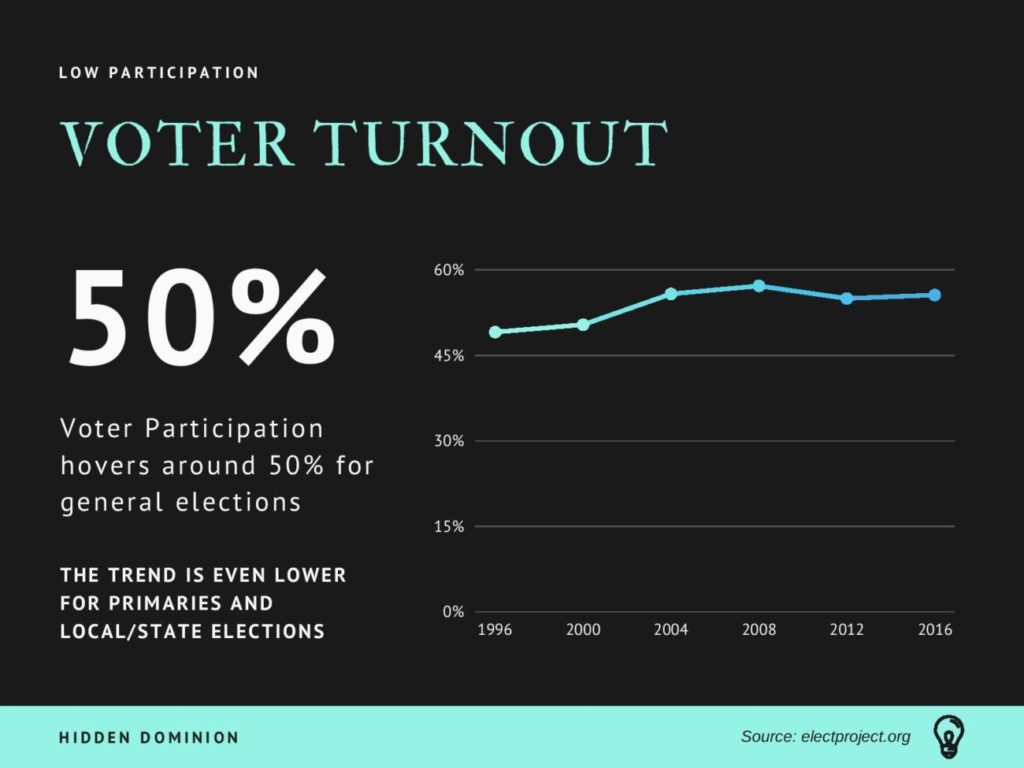
Most voters have no idea about the impacts that would be caused by instigating policy changes.
A research study was done on this by JustFacts. The results are astounding:
For each question, voters were offered a selection of two or more answers, one of which was true. Voters were also given the opportunity to reply “I don’t know.”
On average, voters gave the correct answer 35% of the time, gave an incorrect answer 52% of the time, replied “I don’t know” 12% of the time, and refused to answer 1% of the time. These poor results indicate that many voters may be casting ballots based on warped notions of reality.
A majority of voters gave the correct answer to only four of the 23 questions.
In total, the rates at which voters gave the correct answers varied from a high of 43% for Trump voters to a low of 31% for Clinton voters:
- 43% for Trump voters.
- 37% for 35 to 64 year olds.
- 37% for males.
- 35% for undecided voters.
- 34% for females.
- 34% for 65+ year olds.
- 31% for Clinton voters.
Even the highest group, Trump voters, had less than a 50% correct ratio.
The questions were not difficult, and should be known to anyone that is voting on the person to lead the most powerful nation on the planet.
Likewise, The McCormick Tribune Freedom Museum did a study and found that 22% of Americans could name all the Simpsons characters, but only 1 in 1,000 could name all five First Amendment freedoms.
These are the individuals that are voting for our representatives (albeit in small numbers because the turnout is so low).
They have no idea about the policies currently in government, so how do they expect their representatives to lead based on them?
How would they know when the representative is doing something damaging to the nation when they don’t even know the current policy and its implications?
Short answer: They wouldn’t.
And that’s a huge problem. No one will vote them out if they’re not intelligent enough to see their representatives’ faults.
Instead of voting on the basis of a belief, or ideology, people are accustomed to voting as a bloc through republics. This is centrally because of “establishment parties” who can seek to control the leadership roles by lumping everyone into groups.
Modern politicians, by themselves, are mainly just public relations experts. They get elected based on their “appeal”, rather than their ideology.
This happens because of the party bloc.
People know what a democrat is, they know what a republican is. They have a thinly veiled line of what each label is supposed to support.
But does anyone really toe the party line exactly? Believe every single thing that a political party supports?
Unlikely. There are always a lot of discrepancies.
But we vote based on these party lines in a republic anyway, because they’re the only ones with a shot at getting elected the majority of the time.
So instead of voting based on an underlying virtue/ideology of a person, we’re voting on their appeal as a candidate of a bloc.
So when they start doing things we don’t agree with, we feel trapped. Like both sides are the same coin, but with a different tagline and animal.
Because of this political party system, we’re not voting for people that align with the constituency on a virtuous or ideological level. But rather, a public relations perspective.
If you have a decent boss when you first get a job, they will provide realistic expectations for you. For example, if you’re a school groundskeeper they will include the following in a daily rap-sheet:
This is realistic. It’s possible to accomplish these tasks in an 8-hour shift.
However, if the boss said to mow 50 school lawns, trim 5000 hedges, and build your own trash facility, it would be practically impossible for a day’s work.
But yet, this is the kind of expectations voters have of leadership roles. And it’s what politicians use to capitalize on their erroneous beliefs.
An obvious example is the presidency. Presidents talk up a lot of hype about conquering the national debt, bringing back millions of jobs, and revolutionizing the social platform.
But they can’t. It’s not humanely possible, especially in only four years.
They have a tremendous amount of obstacles to doing even one simple thing, yet along changing everything.
Just look at President Trump trying to pass immigration bans. He’s been blocked twice now. That is just one policy point, one executive order, out of tens of thousands.
President Obama was delayed and obstructed by the Senate and the House hundreds of times.
Judicial review causes presidents to constantly fight in the war of checks and balances.
Every president faces these obstacles. Similarly, every single governmental office does the same, but on a smaller scale. Just like a president, a governor will not be able to change everything.
But they say they can. Because of voters’ unrealistic expectations.
Democracies aren’t dictatorships. One person cannot yield a verdict and immediately have it enacted.
Without realistic expectations, voters get bogged down and either A) don’t vote in the future or B) lose faith in the country’s governmental structure.
Both of which are tremendously important aspects to keep a government alive and healthy. It’s a democratic self-defeating prophecy.
Voters also set expectations too high for certain social issues. Things such as Social Security. It’s not sustainable. It never would have been, yet it was stated to be a realistic retirement strategy in generations past.
The same goes for any type of policy recommendation, such as minimum wage or globalism.
Voters don’t have the much-needed realistic expectation of what to expect and what could accurately be accomplished within the democratic framework.
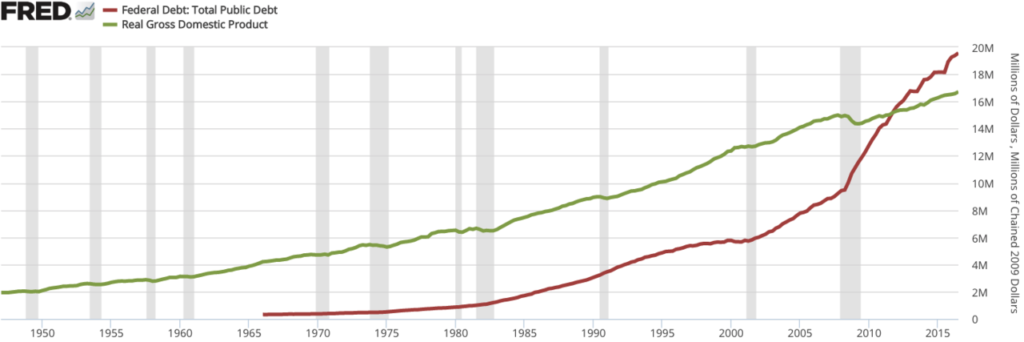 The student loan debt in the US is in the trillions of dollars.
The student loan debt in the US is in the trillions of dollars.
Healthcare is destroying doctors/nurses through malpractice insurance and ravaging upward in costs to everyone.
We’re losing our most profitable and important companies to outsourcing and offshoring.
The US national debt per taxpayer is $165,000.
Yet some of the most talked about and important aspects of people’s voting patterns include weed legalization, giving federal money to Planned Parenthood, and letting men in the women’s bathroom.
While I share plenty of core beliefs on certain issues, I recognize that they are small and don’t base my vote on them.
Others don’t do the same.
Take the federal money to Planned Parenthood example.
If our economy collapses, will it matter if PP had that funding?
If we enter a recession with super high unemployment, stagnant wages, massive layoffs, and economic downfalls (such as the Housing Market crash), will it matter in the slightest if PP got the federal money that year?
No. Not in the slightest. No one would be worried about PP if they couldn’t even get a job or put food on the table. That issue is a small issue compared to the monumental issue looking us in the face: the economy.
But only the minority vote based on these important issues.
It’s as if the voters are inside a picture of a house with a wide lawn and plenty of beautiful flowers. They have un-breakable tunnel vision on the one dying flower in the field of otherwise gorgeous options, doing everything they can to bring it back to life; while not noticing that the house is catching on fire.
This one is certainly a doozy. Voters occasionally vote in individuals who will work against their own interests. Or will work against the interests of the majority of the country.
One excellent example of this in action is affirmative action in college admissions.
Underrepresented minorities (mostly blacks) get special privilege in favor of their college admissions when compared with identical qualities from another ethnic group.
This program was instituted through white voters voting for the democrat party that favored enacting this legislation.
It’s a direct assault on “equal rights” between ethnic groups (which Democrats also claim to stand for), while also creating a unique situation.
White voters specifically voted for candidates who would make it harder for them or their children to succeed.
But not only whites. It also was against the interest of blacks. Blacks voted for party members that also touting this line as well.
However, affirmative action in college admission has shown to actually hurt blacks: [1] [2].
Both of these groups (white and black) voted against their own interest.
Is it because they are un-educated political voters? Maybe. But it could also be because they vote based on appeal, instead of ideology. The common term for it nowadays is virtue signalling.
This is just one example of individuals voting against their own interest. It seems inherently ridiculous, like it would never happen, but it does. And quite frequently in democracy.
And as we drift further to the hands of leftists, the consequences of these votes against our own cumulative interests are going to get much more extreme.
We mentioned virtue signalling in the example above, and that is exactly another issue facing democracy.
While virtue signalling is a relatively new term, voting on emotional appeal has been around since at least the early Athenian democracy.
This issue ties in with the idea of politically under-educated voters and the problems with the party system.
When individuals are under-educated on how policy will work, they resort to other mechanisms to help them decide who to vote for.
In comes the party bloc system.
So the party uses emotions to appeal to the classes of individuals that don’t know how certain policies will actually go forward.
Like in the affirmative action example above. I’m sure those who voted for it had good hearts and good intentions. However, they didn’t know enough about the subject and chose to vote for it based on its emotional appeal rather than its legitimacy as a policy.
Many issues shaped in the US today follow a similar tone. Democracies capitalize on this through the use of the under-educated voter and the political party system.
One glaring example is the European Union. The EU consists of un-elected bureaucrats that may, or may not, vote in the interest of the nation-states themselves. Many focus more on an overall platform. Meaning, they care more about the interests of the EU itself than the conditions in the member states.
Consider the European Commission. The un-elected enforcement arm of the EU. They have no oversight, and no one to work for. They don’t rely on appeasing any member state or any constituency.
And yet, they are in charge of every single member of the EU and their residents. So much for democracy, when the voting aspect can be left out of one of the most important arms of it, legal enforcement (the commission).
Or the Chairman of the Federal Reserve here in the states. The person in charge of the Federal Open Market Committee and the monetary policy in the US. Elected? Nope. Just appointed.
Same goes for their board members. And the regulators. Call me crazy, but the people in charge of the money supply should not be appointed. They should be held directly responsible to the citizens.
And we can’t forget about multinational-global corporations. Many people seem to side-step this discussion. But the CEOs and individuals in charge of these conglomerates are highly valuable.
These companies work for bottom-line profit. Whether that helps out their native country or not, doesn’t really matter. But a handful of individuals (CEO, CFO, Board) control a huge aspect of our economy.
If they decide to outsource, we could lose tens of thousands of jobs. We lose the GDP. We lose the technological advancements they may bring. In short, we lose a lot.
And yet, they (CEO/CFO), are only required to report to their board. The board only cares about profits and quarterly results. For individuals that have so much sway over how each country can thrive, it’s odd that they report to none of the citizens they will directly impact by their decisions.
I’m not saying that every global corporation and democratic institution should be nationalized. But they should have some type of mechanism to keep them in line, in the interests of the citizens of their native country; and not just to their board of directors.
During election cycles, how often do you see political ads and commentators targeting a person’s character rather than their beliefs?
It’s probably fairly often.
On top of that, how often do you see politicians spouting about their own character, rather than what they intend to accomplish?
It happens all the time.
Instead of voting based on an individual’s beliefs, values, and ideology, we vote on their character.
This effect has a strong tie-in with the un-educated voter problem, along with the “vote by party” style voting. But in essence, it’s also its own beast.
When we elect based on character, and character alone, we have no idea how their ideological traits align with the constituency.
When deciding on who to vote for, do you think it would be better to know about their:
OR
If you don’t know their true policy proposals, how are we supposed to gauge their success/loss for the next election cycle?
Simple. We can’t.
And that’s exactly what they want. If we don’t have a clearly defined agenda, we can’t measure their success in respect to it. Thus, we can’t say if they failed or succeeded.
So, within a representative form of government, they want us to vote based on their character. They can give a glimmering light of a person, they can’t give us realistic policy promises. We vote on a faulty character of a politician rather than actual policy.
And many of us have taken the bait. Look at the 2016 election cycle. Everyone was focused on how Trump was a meanie and how Rand was a nobody. But does that have any effect on what they could do policy-wise? Nope. But for some reason, it’s a huge issue in democracies. Even when it should only be a minor one.
There is no simple answer to any of the major problems facing our country today.
Yet everyone sure acts like there is one.
A way for a politician to get votes in a representative form of government is to get the population on his side. An easy way to accomplish this is by giving an elementary example of a policy and continuing ramming on about it without discussing how it will affect everything else.
A great example is the minimum wage debate. I wrote an article detailing (just some) of the pro’s and cons. There is no simple answer to the question of minimum wage, yet Bernie Sanders sure liked to yell about $15 an hour.
And it was a great play. It gets everyone on board with him that works for low pay, and doesn’t understand elementary economics. A $15 minimum wage is very different in New York City versus Rural Mississippi. But he continued nagging on about enacting it everywhere using a federal policy.
The truth is, instituting a $15 an hour minimum wage may help some. It may hurt others. The answer is gray, as is the option of not touching the minimum wage. There is no clear answer. It’s a dumbed-down societal problem.
Think about intervening in other countries militarily, fiscal policy, interest rates, abortion, drug legalization, etc. There is no answer that will solve all of our problems and won’t create other ones. If there was, life would be a lot easier.
It’s an easy catch for politicians, though. Use emotion and a moronic policy to attract the un-educated voters around us.
And politicians and voters alike will continue to dumb-down these complex problems in a republic. And it won’t make it any easier for us to communally and realistically solve them.
A major issue facing representative republics includes the ‘nearing election cycle shenanigans‘.
Politicians will do complete 180’s on what they have been doing previously.
Look at German Chancellor Merkel. She was the individual who caused the migrant refugee crisis, pledged to accept them all, and brought tens of millions of economic migrants and refugees to flood Germany.
What happened near the election cycle? Well, she changed her mind and said “re-elect me and I’ll send some of them back”.
Now, you may look at this as a benefit. A leader changing positions based on popular support.
But it’s problematic because it’s two completely different ideologies. How do you know that if you re-elect her, she will follow that promise? You don’t. And you don’t know what ideology she is, if she can just flip-flop as the election nears.
These few months prior to the election can completely change everything. Politicians can enact and do things they normally wouldn’t do, retract previous statements/executive orders, and anything else they can think of to compile more votes.
In short, it follows impulse. Not common good. The leaders of a country should always be following the common good, not when it is convenient for an election.
Tragedy of the commons means:
Individual users act independently according to their own self-interest. This causes behavior contrary to the common good of all users by depleting or spoiling that resource through their collective action.
Ruin is the destination toward which all men rush, each pursuing his own best interest in a society that believes in the freedom of the commons. Freedom in a commons brings ruin to all.
And republics are rife with it.
Consider some of these examples:
The tragedy of the commons is mainly used in economics, but it definitely applies to the political strife that is rippling through democratic societies today.
One person’s temporary gain, everyone’s future loss.
In application to republics, this means:
Instead of individual beliefs, the person must succumb to the group or be outed
And it has been a huge problem throughout democratic societies for a long time now.
Look at the McCarthy era: communists were ousted and lost their jobs or their livelihood.
Or the modern “racist” terminology. If you don’t succumb to the leftist beliefs, you’re called a mean name and immediately your beliefs are disregarded.
Herd mentality thrives in societies where the majority lead. And that’s exactly what a democracy is, government by the majority.
So you either get on the bandwagon, or it takes off without you.
It forces values on individuals on how they should live their life. And it requires a great deal of effort and courage to combat it, which is why progress is so much slower in a democracy. It requires the ability to change the minds of the majority.
While it can be done, it takes time. And this could be a good, or a very bad, thing. Depending on the topic at hand.
But no matter how we look at it, smashing away individual values and beliefs is shortsighted when the future of humanity has been and always will be decided by the innovators and the minority.

Governments change frequently in a democracy. There is minimal (if any) political stability throughout the years.
US Presidents, the diplomats for other countries’ leaders, changes hands every 4 or 8 years.
The house of representatives is even shorter.
Politicians are not miracle workers. They face a lot of obstacles to securing actual change in communities.
How are they supposed to accomplish anything of significance with only a short amount of time? They can’t. They have to focus on a key issues and attempt to get them done, while ensuring that everything else doesn’t fall apart around them.
Most aren’t even good enough to accomplish that.
Political instability is a significant weakness of democracy. When politicians have to focus on re-election, they do things they wouldn’t otherwise do. They can’t think long-term. They have to think short term. It’s the only way to honestly showcase their successes. And then they subsequently blame their faults on their predecessors’ lack of long-term insight.
Long-term beneficial policies are then put on the back burner. We don’t look after the next generation, all we care about in a republic is what the politician can do within the next four years for me.
There’s no community-centric policies. No focus on bettering the country for the next generation (Like cutting social programs, lowering the debt!). And potentially one of the biggest problems with democracy.
If you want an in-depth analysis of this specific point, I urge you to check out the full 14 video series by Stefan Molyneux on YouTube covering Human Intelligence.
There’s one video in the series that is particularly useful for this discussion:
Republics require that the population has at least an average-high IQ.
From a logical standpoint, it’s quite easy to understand.
Does this process ever seem to happen in actual politics?
We need a high IQ and a smart political population (intelligent, not “college educated”) to ensure a reliable democracy. And we don’t have one. It’s a flaw with democracy that even the individuals that have no idea about politics can cast a vote. And thus determine the fate of those who do.
Things like idiot compassion and virtue signalling are at play with this problem of democracy.
As described in problem #15: republics require that the population have a high IQ.
But then they also falter on attempting to keep that high IQ or increase it.
Instead of monitoring immigration on the basis of national pride and IQ, they encourage using other metrics of determining who to admit as an immigrant. This, in turn, has brought a lot of immigrants from predominately low-IQ nations that do not contribute to the democratic process as fluently as immigrants that have higher IQs.
Instead of focusing on improving IQ and intelligence of the population, republics focus on smaller issues (problem #5). It’s easier to lead a nation of sheep than a nation of people who can see through politicians’ lies.
This has been a factor in republics all the way back to the Roman age.
Roman morals were very different from ours. But prominent philosophical writers always complained throughout the years about moral degradation.
The same for Venice. And for every republic since then.
As anti-traditionalism and “social progress” continue to advance exponentially throughout decades, it eventually reaches a point where it becomes extremist activism. And this extremism is what causes the degradation of morality and philosophical values.
Take a look at some key metrics of our own society:
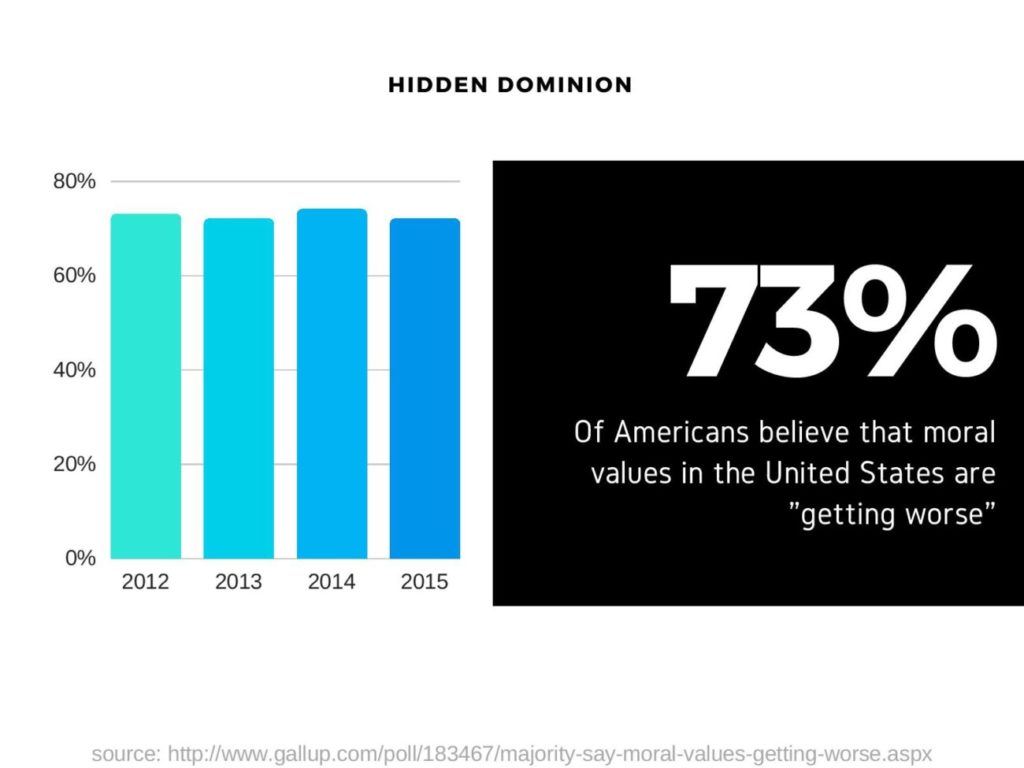
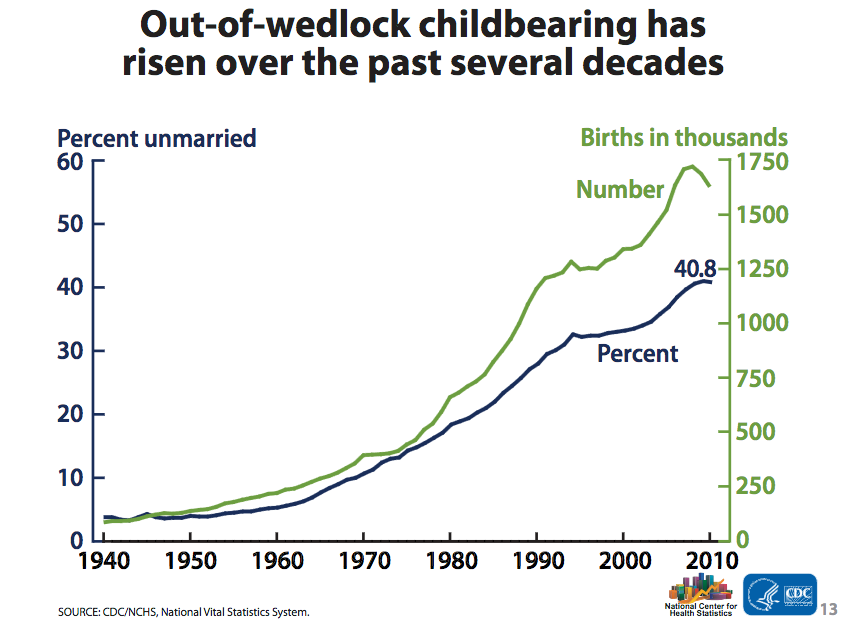
With the vast majority of Americans believing moral values are in decline, we hit a significant problem with our society.
The moral values that we uphold showcase what kind of society we desire. If it falters, so does our democracy.
But it’s easy to do when you can just vote for free things and hope the government takes care of everything for you.
However, when that happens, we begin the devolve into socialism or fascism.
But all is not lost. There are a few areas where we are getting better with our moral values. Such as the teenage pregnancy epidemic:
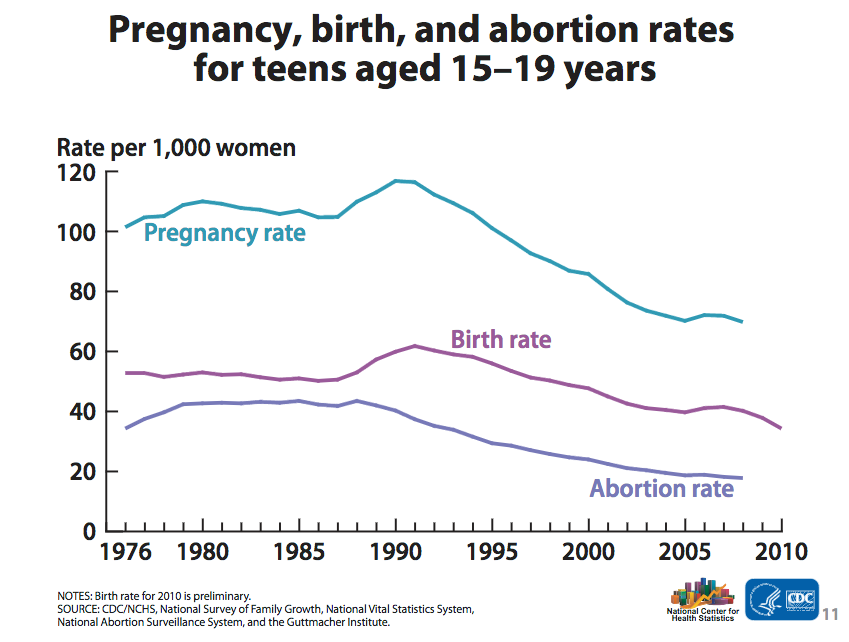
But sadly, this is the exception to the rule. And is more likely simply because the birth rate as a whole is declining, which is bad.
As a rule, as the length of the republic increases, degradation to degeneracy increases.
Just look at the change in advertising. It’s gone from being predominately product driven to sex and virtue-signal driven.
Preserving cultural morals is nearly impossible to accomplish inside the framework of a democratic society unless the culture shifts. Which causes an extremely dedicated movement to accomplish.
This problem is a relatively new development in our republic-styled democracies in the last few years. It has plenty of basis in history, though.
I attribute it in part to the degradation of culture.
This idea that we are all equal, all human, is a noble concept. But also a dangerous and incorrect one. It doesn’t face the inescapable fact of biological inequality and natural hierarchies.
Men are biologically stronger than women. Women are better nurturers. Different races have different genetic advantages when compared with their natural environment and things they can be infected by.
An example is that blacks are more resistant to Malaria, making them more susceptible to sickle cell anemia.
Certain people are naturally more intelligent than others, and will thus succeed more often or make more money. By acting like we are all equal, it makes it seem as though the other person “stole” from the rest of society for being an above-average wage earner. It creates the idea that socialism, or wage equality, is a respectable argument (when it is far from it).
In western republics, this idea that everyone is equal, and no one has any possible differences is plaguing the society. Whereas we don’t see this with nationalist countries such as Russia, or communist ones such as China or North Korea. It seems specific to western nation republics.
This myth greatly harms technological, scientific, and medical advancements. It also hinders peoples’ ability to have open discussions on the differences between races, cultures, and people in general.
It’s a stagnation in society. And it seems that democracies are the most affected by it.
Comments are closed.
(Learn More About The Dominion Newsletter Here)
That’s why we need socialism
Hell no you lunatic. Society drifted to the left already, that’s why we have half these problems in the first place.
Your RELIGION has killed hundreds of millions
The principles and values underlying socialism are also what led us to this, it is not the fix. It’s yet another disease.
Hello, nice to see your work. Your analysis is very impressive. However, I regret that some of your views, especially on the type of regime in your country, are biased. I don’t mean to belittle you. But I think you must have never been to the countries you belittled before writing this article. If you put aside your prejudices, go to those countries and ask their people what they think of their government, I think you will come to a better conclusion. I think those countries do not understand democracy, nor do they have the ability to establish democracy, but they give up using those regimes after deeply understanding their disadvantages. Because they have been persecuted by your democracy for too long.
In addition, here are some questions to ask you, hoping to arouse your thinking.
1. Although the western countries led by the United States call their regimes democracies, are democracy and freedom really the patents of the so-called democracies? If there is no word “democracy” in the name of the regime, is their rule dictatorship?
2. If democracy is really the best regime, why are their people unhappy after many countries convert to democracy? For example: Russia, Ukraine, and those Arab countries
3. What is freedom? Freedom in order after clearly agreed with the government? Or is it free in disorder under the vague definition?
4. In the political environment of the two party system, how should governments lacking reform power reform the regime they established in the pre industrial era?
5. Democracies require their people to be sober and rational. In this information age, there are fewer and fewer sober people in a large amount of information. How can your country maintain your system under this trend? As far as I know, your politicians are still using bad techniques such as populism to confuse your people.
6. I often see many demonstrations about human rights in your country. It is often seen as the embodiment of freedom and democracy in your country. But don’t you think it’s just a group of oppressed people venting on the street? They don’t even know who their misfortune comes from, and how to promote social progress? Homosexuals, blacks, women… They fight and blame each other, but those who squeeze them are not hurt at all, are they?
7. If the 10 richest people in the United States stand in front of the White House, do you still have confidence to say: is your head of state the president?
The above are some of my questions about your regime. If you can read it without arrogance and reply to me, I will thank you very much. It would be better if you could calm down and see what socialism is.
Hi Siyuan, this article is from early 2017. It’s now almost 2022. My thoughts on the matter have evolved over time.
I’ve never been a fanboy of democracy, even back in 2017, as you should clearly be able to tell from the fact that I wrote a quasi-book here with 36 points against democracy between these two articles. I had previously thought democracy the best of the worst options. Now, I’m not entirely sure where I stand on which is the best/worst given the current “regime” options, as you call them. I’m not sure I care, to be honest.
What I do believe in wholeheartedly, is that they are all lackluster options, and we need an alternative. Democracy (rule by many) is trash for the reasons both you and I gave, but your defense of “socialism” and dictatorships (rule by few and rule by one) are equally as problematic because those systems just produce malevolent leaders over time that exploit their populations and provide absolutely no accountability measures if the leaders go rogue. I won’t be forced to settle between two-three terrible options. Which is why I’ve spent a significant chunk of the last 5 years studying, researching, reading, and trying to develop an alternative (Enclavism). Which is what most of my modern articles are about. I suggest you look into those for my more up-to-date ideology.
Thank you for your reply. I also happened to see this article when searching for information. The reason for this comment is that your article has depth, which has aroused my thinking. I sincerely hope that I can discuss with people with different views and positions, rather than causing disputes to force a unified result. Thank you for your reply and wish you a smooth progress in your research. I hope my unorthodox English doesn’t bring too much trouble to your reading.